
|
Raj Ayyar: David, it's a pleasure and a privilege to interview you. Your recent book The Soul Beneath the Skin has been hailed as a major paradigm shift and as a boldly innovative way of revisioning what it means to be gay. Can you share some of the highlights of this work with our readers?
I propose a new path for us to live in wholly new and more sustaining ways with each other, to better allow us to manifest the love we sought out by coming into a gay world. It is a project all around our values, and what we truly want from each other. Raj Ayyar: Tell us a little about the Manifest Love teams that are springing up nationwide. What is their purpose? We help gay men find new ways to be with and for each other. David Nimmons: Our book, workshops and teaching, analysis and action help guys bring new values and habits into their lives with other gay men. Our Loving Disturbances actions bring new kinds of values into being.
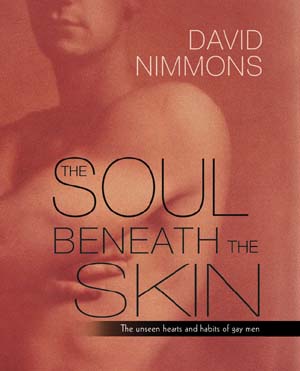 Raj Ayyar: One of the aims of the Manifest Love groups is to create a
Whitmanesque 'army of lovers' throughout the country. Any comments?
Raj Ayyar: One of the aims of the Manifest Love groups is to create a
Whitmanesque 'army of lovers' throughout the country. Any comments?
David Nimmons: At this millennial moment in culture, gay men's truly radical act is not just to claim our sexuality, but to reclaim our hearts, with and for each other. Many queer men are hungry for another way of being with and for each other. We aim to create those. As we do, we will come to understand our lives and what we are to each other, in wholly new ways. We now have several thousand men who have been exposed to our work, and the numbers are growing. Raj Ayyar: It seems to me that the recent American tradition of gay spirituality from Walt Whitman to Mark Thompson is radical in that it does not divorce the body from the soul or the spiritual from the enjoyment of the sensuous and the sexual. Have you been influenced by this tradition and, if so, to what extent? David Nimmons: There is no reason to separate them, and every reason not to. However, of late many men find themselves in bars, wanting connection and finding only competition; in baths, seeking solace and finding only sex; in clubs seeking affection and getting only attitude; or standing outside them all, wishing for inclusion and feeling often excluded. We see visible, accessible practices and structures in core gay communities -- bars and baths, skin rags and substance use, A-lists and relentless body fascism and feel anything but loved. Our work is to help bring that into balance in a way that celebrates both. Raj Ayyar: Suppose an individual or small group wants to start a Manifest Love chapter in Podunkville, Alabama. How would they go about doing it?
Raj Ayyar: There is a widespread touchphobia and distrust (at least in Anglo-European cultures) of sexual and non-sexual intimacy between men. Many gay men struggle with this as much as their straight counterparts. What are some strategies and techniques for overcoming this distrust and creating spaces of joyous touching, embracing and celebrating? David Nimmons: Our work is not primarily about touch, but about the values and ethics that gay men seek to embody in our lives. We work to help men redefine what they truly want with each other. Touch is a part of that, as is intimacy, love, honesty, caring, nurture. The notion that sex is the first way we know to know each other needs to be broadened. We have done experiments in nurturing touch, but we also do work around eyes and cruising culture, the language describing our relations, dance, bliss, gender relations, and much more. It is an interesting question why we have elaborated sex clubs and bars as cultural meeting places, yet you will not find a free storefront gay massage collective in any gay neighborhood. Might that also be one possible option to give us some of what gay men are seeking in our sex? There are whole new ways to think about what we can be, if we just open our minds. Raj Ayyar: Brotherhood, celebration of same-sex love, joyful intimacy---these are wonderful ideals, David! I affirm them wholly. Yet, there are at least two obvious serpents lurking in this gay Edenic vision. One is racism within white-dominant gay communities, a racism that marginalizes, stereotypes and/or sexually exoticizes the gay man 'of color.' The other is the horrendous ageism that systematically discounts the older gay male as a predatory and yet pathetic 'troll.' How would you address the challenge of these 'serpents?' David Nimmons: The book addresses this clearly. Exclusions, distance and mistrust are problematic whether one feels them because of race, age, beauty , or kink. Generally, gay men have much more practice at living in a critical stance with each other than elaborating sustaining options that cut across identities. That hasn't gotten us far enough. It creates more distance, cynicism and hardens the lines of difference. Your notion that racism is confined to majoritarian white communities is perfect example of a habitual mistaken discourse. The discourses about race, sex, body, age, and beauty are deeply familiar. But we've not worked to develop sufficient new action, and thus we are left in a stance of criticality, as your question reveals.
Raj Ayyar: In many LGBT communities, there is a whole slew of separatisms: lesbian vs. gay male, gay men and lesbians vs. the interests of the transgendered and so on. I don't think that mere "tactical" unity for a Pride parade heals these divisions. Any comments? David Nimmons: Such focus on questions of identity and separation have largely crowded out work around common sustaining values, and virtually eliminated action to support novel forms and modes of communal love. The limits of identity politics are clear. It is the discussion we know how to have, turf tilled so often it is largely mud. But when was the last time those discussions surfaced any novel hope or emboldened us to more humanitarian action? It is much harder to practice creating viable options. Raj Ayyar: Do different Manifest Love groups form alliances with feminist and civil rights groups in their respective areas? David Nimmons: We create no political or strategic alliances, right, left or center -- this is not political work, but ethical and values work. The question presumes a familiar model of activism. For too long we have seen activism as facing outward, speaking to power about rights, access, and entitlements, needing alliances and coalitions to prevail. A deeply traditional view of activism. our work, rooted in feminist theory, does not advocate around power. We redefine options among each other in our communal, intimate and shared relations. It is work in communal ethics and asks us to face in and ask new questions -- a kind of work among us, for us, by us, about who we are to each other. Of course, that work needs to take place across different categories. Raj Ayyar: David, there's been a resurgence of lip-smacking Puritanism in the context of the AIDS epidemic. The possible infection hazards are glibly converted by the Religious Right into an abstinence fanaticism. Can we regain a sense of celebrating our bodies and affirming sex in all its rich hues?
Raj Ayyar: Is the message of Manifest Love transcultural? Can it be applied with suitable cultural modifications to a non-American context? David Nimmons: Anyone who has looked at Manifest Love will understand that it reflects values espoused in great spirit traditions -- Buddhism, Christianity ,Judaism, Islam, and traditional native cultures. But it operates in the decidedly modern western context, of an elaborated social space for queer people. I would have grave reservations about exporting it in this form to other cultures, although its values basis might well find fertile acceptance. Raj Ayyar: Do you think that the Western model of post-Stonewall 'coming out' applies to all cultures or do gays in different cultures need to come up with their own paradigms of identity-affirmation? David Nimmons: I would quote Gandhi on the subject of western civilization. "A great idea-- somebody should try it." I am as dismayed about the increasing colonial power and dominance of the western model of gay life as a cultural export as I am about the failure of many non-western cultures to do the work of making life sufficiently safe and reverent for queers. In modern times, there is a sad lack of modern paradigms of non-western queer identity affirmation to model on, and far too many rainbow flags. We need both.
Raj Ayyar: Can you suggest techniques for overcoming the shame and the internalized homophobia suffered by many gay men? David Nimmons: We must learn to tell our entire story clearly and better behold the extraordinary beauty of the gay male experiments. We consistently tell the most unkind, dismal and cynical narrative of ourselves, ignoring the myriad ways we solve problems that have vexed the world-- male gender oppression, public violence, isolation from friends, failure to caregive. Each day we wallow in such a fundamentally wrong and dismal narrative, we blind ourselves to our heart's best hopes, and instill the very problems we decry. The best cure for internalized homophobia is to stop magnifying it. Raj Ayyar: David, tell us a little about yourself. At the end of the day, just who is David Nimmons? David Nimmons: Having worked in gay world, institutions, activism and groups for 20 years, I hope my work, ideas and actions speak for what it is I find important and sustaining. I can't wait to see what the next 20 years will look like. |
|
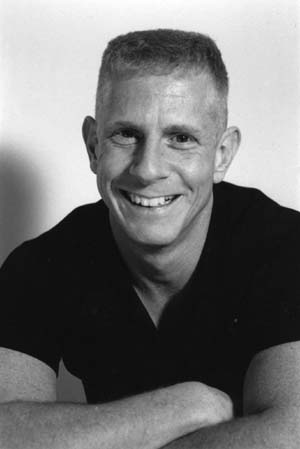 David Nimmons
David Nimmons 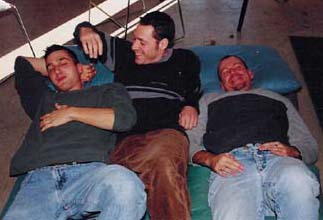 Participants in the Manifest Love groups
Participants in the Manifest Love groups 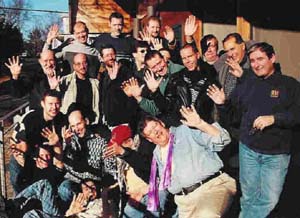 A Manifest Love retreat in Providence, R.I.
A Manifest Love retreat in Providence, R.I. 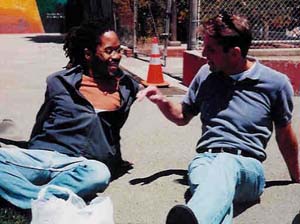 At the Manifest Love San Francisco picnic
At the Manifest Love San Francisco picnic 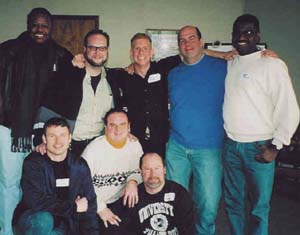 A meeting of small group leaders of the Manifest Love movement
A meeting of small group leaders of the Manifest Love movement